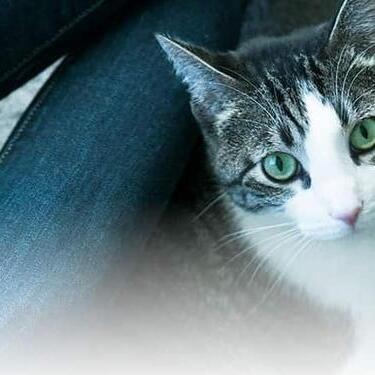
-
Find the right food for your pet
Take this quiz to see which food may be the best for your furry friend.
Find the right food for your pet
Take this quiz to see which food may be the best for your furry friend.
Featured products
 Small & Mini Savory Stew with Chicken & Vegetables Dog Food
Small & Mini Savory Stew with Chicken & Vegetables Dog FoodA delicious complement to the nutrition of Science Diet Small & Mini 7+ dog food
Shop Now Adult Healthy Cuisine Roasted Chicken, Carrots & Spinach Stew Dog Food
Adult Healthy Cuisine Roasted Chicken, Carrots & Spinach Stew Dog FoodDelicious roasted chicken paired with tender vegetables in a succulent stew
Shop Now Adult 7+ Perfect Digestion Chicken, Whole Oats & Brown Rice Recipe Dog Food
Adult 7+ Perfect Digestion Chicken, Whole Oats & Brown Rice Recipe Dog FoodScience Diet's breakthrough nutrition supports ultimate digestive well-being & healthy microbiome for dogs age 7+
Shop NowFeatured products
 Adult 7+ Tender Tuna Dinner Cat Food
Adult 7+ Tender Tuna Dinner Cat FoodWith delicious chunks in a decadent gravy
Shop Now Adult Savory Entrée Can Variety Pack Cat Food
Adult Savory Entrée Can Variety Pack Cat FoodPrecisely balanced nutrition with the delicious taste of savory minced chicken to help fuel the energy needs of cats during the prime of their life
Shop Now Adult 7+ Senior Vitality Chicken & Vegetable Stew Cat Food
Adult 7+ Senior Vitality Chicken & Vegetable Stew Cat FoodImproves Everyday Ability to Get Up & Go
Shop Now -
Dog
- Dog Tips & Articles
-
Health Category
- Weight
- Food & Environmental Sensitivities
- Urinary
- Digestive
- Joint
- Kidney
-
Life Stage
- Puppy Nutrition
- Adult Nutrition
- Senior Nutrition
Cat
- Cat Tips & Articles
-
Health Category
- Weight
- Skin & Food Sensitivities
- Urinary
- Digestive
- Kidney
-
Life Stage
- Kitten Nutrition
- Adult Nutrition
Featured articles
 Does My Pet Hate Me?
Does My Pet Hate Me?Learn tips for bonding with your pet if you've ever thought, 'My dog doesn't like me, or 'Why do I have a standoffish cat?'
Read More Why Are Dogs and Cats So Cute?
Why Are Dogs and Cats So Cute?If waggy puppy dog tails and furry kitten yawns make you swoon, you're not alone. Why are cats so cute? And, dogs too! Let's find out!
Read More Do Dogs and Cats have Belly Buttons?
Do Dogs and Cats have Belly Buttons?Learn whether cats & dogs have belly buttons like humans, what the function is, and if there are any health concerns associated with it.
Read More -


Ethylene glycol, more commonly identified as a component of antifreeze, is a very serious toxin to cats. While it's most commonly known for being a coolant in vehicles, it can also be found in brake fluid, toilet winterizers for recreational vehicles or summer homes, heat exchangers and portable basketball hoops. Once ingested, antifreeze can be absorbed within about 40 to 60 minutes. Antifreeze and cats are a very toxic combination — even a very small ingestion can result in severe signs of antifreeze poisoning and potentially death. Here's what to do if you suspect that your cat drank antifreeze.
What to Do If Your Cat Drank Antifreeze
Once absorbed, antifreeze is metabolized by the body into multiple toxic substances which result in the development of physical symptoms and acute kidney failure. An ingestion of 1.4 ml of antifreeze per kilogram of body weight may result in death. Therefore, if your cat drank antifreeze, or if you have a high suspicion that they've ingested some, you should take your cat to a veterinarian immediately.
If the cat has antifreeze on its paws or fur, it should be washed off to prevent any continued exposure while traveling to the vet for evaluation. It is also very important to remember to bring the container or label for the antifreeze with you to the vet so that they know exactly what was ingested. Some forms of antifreeze are less potent than others.
Symptoms of Antifreeze Ingestion & Poisoning
Following antifreeze ingestion, symptoms develop rapidly, and for simplicity, they can be divided into early and late symptoms. Early symptoms are related to ethylene glycol, which is a very potent alcohol; these symptoms can be seen approximately 30 minutes to 12 hours following ingestion. The early symptoms of antifreeze in cats include:
- Vomiting
- Nausea
- Depression
- Weakness
- Loss of balance
- Increased drinking and/or urination
- Rapid breathing
Late symptoms, which are the result of the multiple toxic products accumulating in the blood stream, develop at approximately 12 to 24 hours in cats and are related to development of acute kidney failure. These symptoms could include:
- Severe lethargy
- Not eating
- Vomiting
- Oral ulcers
- Salivation
- Seizures
- Producing only small amounts of urine
If you notice any of these early or late symptoms, be sure to pay a visit to your vet as soon as possible.
Diagnosis
Rapid diagnosis of antifreeze poisoning is key. Diagnosis is normally based on witnessed ingestion or known recent access to antifreeze, and it can also be based on recognition of the early symptoms of toxicity. In some cases, the use of a special light called a Wood's lamp will show glowing residue on the face and paws, urine or vomited stomach contents. Residue could suggest exposure as a florescent dye is added to antifreeze.
Blood and urine test results can further support any suspicions of ingestion. The combination of antifreeze and cats can cause diluted urine, the development of a specific type of crystal in the urine, and decreased bicarbonate and increased phosphorus levels in the blood. All of these signs can occur in the first few hours after a cat has consumed antifreeze. There are commercially available tests for detection of ethylene glycol antifreeze in dogs, but unfortunately, they are not accurate in cats as cats develop toxicosis at much lower levels than dogs. If available, running an ethylene glycol level at a human hospital could be a more reliable way to evaluate for the unfortunate mix of antifreeze and cats. In the late stages, acute kidney failure and elevation of kidney blood values develop secondary to the antifreeze ingestion. Sadly, once this occurs, the prognosis for recovery is grave.


Tasty Tips
Treatment
If your cat drank antifreeze, treatment with antidotes such as fomepizole or ethanol could prevent production of toxic metabolites and promote excretion by the kidneys. If you live in an area where it's available, dialysis can also be performed with high success rates in the early stages of exposure. For cats, the window for treatment following antifreeze ingestion is very narrow. Treatment can be successful if initiated within three hours of ingestion. If you saw your cat drink antifreeze, or if you're suspicious of an ingestion, it is very important that you seek emergency care immediately. Some cats that are successfully treated for antifreeze ingestion may have residual kidney damage secondary to the toxicity.
Preventing Antifreeze Poisoning
Antifreeze and cats do not mix well — prevention is the key! The best way to prevent medical complications related to antifreeze and cats is to keep cats indoors and keep all chemicals put away so that there is no risk for ingestion. If your cat has access to a garage or workshop area where chemicals and automotive supplies are stored, everything should be kept closed. Keeping up with recommended routine vehicle maintenance to prevent any antifreeze leakage, and fixing and cleaning up any fluid leaks from your car, can also help to prevent exposure. Some states require the addition of a bittering agent to decrease the attraction to antifreeze as it naturally tastes sweet, but cats with limited access to water may still drink it out of thirst. There are also some types of antifreeze that do not contain the potent ethylene glycol and are considered "safer" and less toxic. The main ingredient in these products in propylene glycol.
Antifreeze and cats can be a deadly combination, so ultimately, prevention is the best treatment. Keeping cats indoors and away from chemicals can ensure your cat's safety. However, if you do find that your cat drank antifreeze, seeking immediate vet care could save your cat's life.


Jessica Seid is an emergency veterinarian practicing in the New England area. She is a graduate of the North Carolina State College of Veterinary Medicine and has been in the field for more than a decade. When she's not helping patients, she enjoys spending time with her husband, daughter and French bulldog.
Related products

Supports energy level and beautiful fur in mature cats

Improves Everyday Ability to Get Up & Go

With delicious chunks in a decadent gravy

Precisely balanced nutrition with the delicious taste of savory minced chicken to help fuel the energy needs of cats during the prime of their life
Related articles

Brushing your cat's teeth is just as important as brushing your own. Learn signs or oral health problems in your cat and how to avoid them.

Discover the benefits of Hill's line of kitten foods and how they provide complete and balance nutrition for growing kittens.

Discover which cat toys games your feline friend might like, and how they are great sources of exercise. Explore our library of articles to learn more.

Discover how to identify cat sensitive skin and what you can do to help your cat thrive from head to paw.

Put your cat on a diet without them knowing
Our low calorie formula helps you control your cat's weight. It's packed with high-quality protein for building lean muscles, and made with purposeful ingredients for a flavorful, nutritious meal. Clinically proven antioxidants, Vitamin C+E, help promote a healthy immune system.
Put your cat on a diet without them knowing
Our low calorie formula helps you control your cat's weight. It's packed with high-quality protein for building lean muscles, and made with purposeful ingredients for a flavorful, nutritious meal. Clinically proven antioxidants, Vitamin C+E, help promote a healthy immune system.

